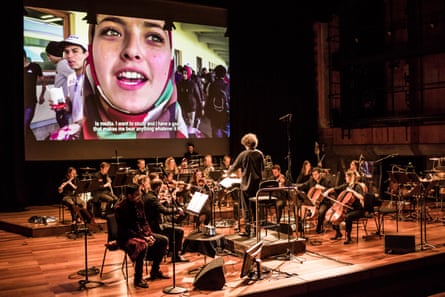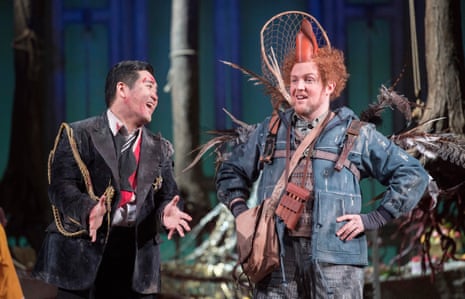Outwitting narrative convention, Mozart’s The Magic Flute retains its mysteries even for those of us who have seen it, for work and pleasure, tens of times and assume we know every extraordinary note. The plot loops, skips, tangles. A simple fairytale grows more sinister on each encounter. What type of compassion permits the “all-wise” Sarastro to wrench a daughter from her mother, even if she is Queen of the Night? Rescue, revenge and righteousness snarl into one. Add to that a pantomimic subplot and the underlying tensions between Freemasonry and Catholicism – Mozart, typically nifty, had a foot in both – and complexity reigns.
Opera North’s new Flute, staged by James Brining, artistic director of Leeds Playhouse, follows the trend of recent productions (Netia Jones’s for Garsington last summer, Simon McBurney’s for English National Opera’s, returning in March) in confronting, instead of minimising, the enigmas. The habitual light-dark, good-evil dichotomy is no longer adequate. Brining’s take, attractively designed by Colin Richmond (with lighting by Chris Davey), has problems, but there’s plenty to enjoy, not least the warm, Irish Papageno of Gavan Ring. His humour threads its charm throughout, providing a framework for the entire opera, as Mozart’s collaborator and librettist, Emanuel Schikaneder, who created the role of Papageno in Vienna in 1791, must have intended.
Musical standards are rigorous, with period instrument style to the fore under the baton of Robert Howarth. Woodwind playing, notably from bassoons and basset horns, was fruity and prominent on first night. Every word of Jeremy Sams’s evergreen, witty English translation was audible, sung without surtitles. Some of the spoken text, conversely, sounded stiff and needs more projection. It’s never easy. Papageno aside, these characters’ identities depend on the richness of the music they sing. In speech they are little more than archetypes.
In a dumbshow during the overture, a child (Madeleine Barker) puts on a crackly recording of The Magic Flute before bed. I guess such miracles do happen. The grownups are having a distinctly fractious dinner party. Parental dysfunction looms. It all suggests a troubled dream, and it’s some relief that Brining doesn’t hammer that idea too heavily. Sarastro (John Savournin), impeccable in white and gold, with militaristic regalia, and dark glasses reminiscent of the Rev Jim Jones, leads a surreal sect of obedient men and meek, habit-clad handmaidens. The Three Boys (whether for gender equality or global shortage, here sung by two girls and a boy) are cadets in shorts and side caps. One omission fell flat: Papagena (a delightful Amy Freston) is robbed of her chance to transform from old crone (too ageist? Come off it) to sexy babe. Instead, she merely pulls off her veil and reveals, beneath her red robes, a pair of fabulous dancer’s legs.
The Australian-Chinese tenor Kang Wang, a gleaming-voiced Tamino, and his Pamina, South African soprano Vuvu Mpofu, lyrical and sweet-toned, made memorable Opera North debuts. Samantha Hay was a precise, fiery Queen of the Night, John Findon convincingly oafish and malicious as Monostatos. For the challenging trial scene, Douglas O’Connell’s video designs gave a lively impression of fire and water, the torrents gushing from brick tunnels surely filmed in Leeds’s own post-industrial waterways.

The Southbank’s five-day SoundState festival presented music by 50 composers from nearly as many countries, including Pakistan, Turkey and Bali, as well as Europe. Eclecticism doesn’t begin to describe its multifarious ambition. A central event, in a concert on a theme of migration and exodus by Aurora Orchestra, was the world premiere of Where We Lost Our Shadows by Du Yun, the Shanghai-born composer and performance artist now based in New York, in collaboration with the Palestinian film-maker Khaled Jarrar.
Thunderous, virtuosic gusts of percussion, played by the Japanese-born Shayna Dunkelman, heralded this composition, in which the Pakistani singer Ali Sethi embroidered exquisite raga material around the colours of western orchestral sounds, eventually joined, to ethereal effect, by the British mezzo-soprano Jennifer Johnston (who also sang, terrifically, Mahler’s Lieder eines fahrenden Gesellen). The film element, showing young Syrian refugees on the road, was overwhelming, nearly threatening to topple the music but done with beauty and seriousness. Describing all the elements risks ending up like a table of world flags. The experience was quite different: unifying and powerfully resonant.
Star ratings (out of five)
The Magic Flute ★★★
Aurora Orchestra ★★★★
The Magic Flute is in rep at the Grand theatre, Leeds, until 1 March, then touring

Comments (…)
Sign in or create your Guardian account to join the discussion